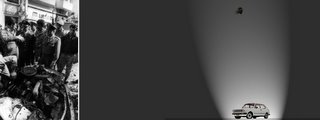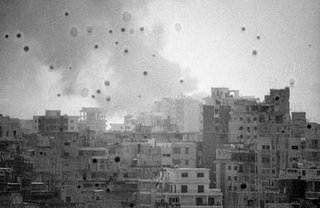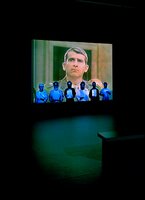The Art of War


Our 15 year civil war is art.
It has been exposed at the Museum of Modern Art in New York for quite some time and through March 11 it can be admired and bought at The Kitchen gallery on West 19th Street in New York.
Walid Raad and his Atlas Group capture the madness and absurdity of the Lebanese conflict. Through his art, Raad re-examines his (and our) fears and hopes at a dangerous and crazy time in our history.
He mocks them and belittles them in an obvious effort to control them and to brake free.
Raad transforms car bombs into art. His focus is on the engines that are the only intact remnants of the detonated car bombs, like souls that are religiously and poetically the only remnants of the dead.
He does not show us the victims, just the cars and their engines. It is both cold and satirical, devoid of humanity like our war, like our leaders who ordered the dreadful acts.
The Village Voice had this to say about his art:
"He lets us know that there were 3,641 car bombs detonated in Beirut between 1975 and 1991. In seven collages titled Notebook Volume 38: Already Been in a Lake of Fire, an invented character named Dr. Fadl Fakhouri presents pictures of cars and Arabic writing. One image reads, "Silver Volvo; August 20, 1985; 56 killed; 120 injured; 100 kg of TNT; 24 cars burned; 11 buildings burned." Raad/Fakhouri fetishizes the facts of violence in Beirut the way Henry Darger recorded the weather in Chicago. Elsewhere, he gives us the serial numbers of engines that were blown from car bombs, how far each motor flew, and where it landed.

In Hostage: The Bachar Tapes, Raad, 38, recounts what he calls the "captivity narrative" of five American hostages held in Lebanon in the 1980s, adding a fictitious Arab who describes nocturnal homoerotic encounters.
In Miraculous Beginnings we see a hallucinogenic 52-second film made by Dr. Fakhouri in which he exposed a frame every time he thought the war had come to an end. It's an abstract image of lost hopes and wishful thinking.
In I Only Wish That I Could Weep we see furtive views of sunsets filmed by a Lebanese army intelligence officer posted to monitor a boardwalk in Beirut."
Walid Raad's work is also exhibited at the Sfeir-Semler gallery in Beirut.

1 Comments:
Great post Zadig. Walid Raad and the Atlas group are doing a great job and they deserve to be better known by Lebanese. I really appreciate the underlying humor of their work. We need more individuals like Walid Raad.
Post a Comment
<< Home